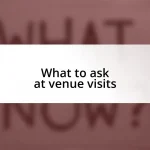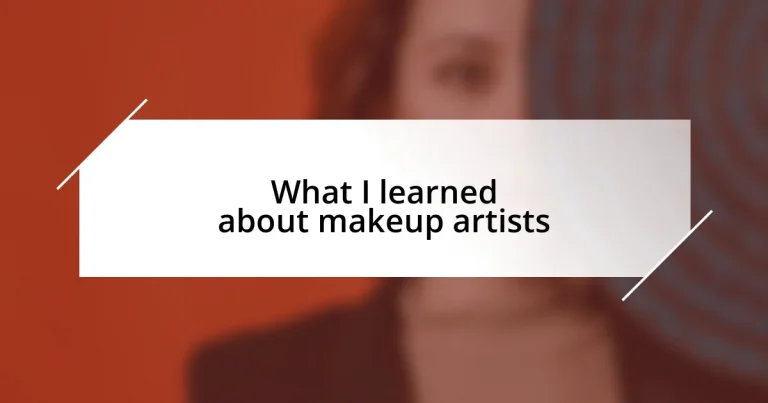Key takeaways:
- Key skills for makeup artists include attention to detail, communication, and adaptability to clients’ needs.
- Essential tools, such as blending brushes and skin preparation products, greatly enhance the quality of makeup application.
- Building a curated and updated portfolio is essential for showcasing artistry and attracting clients.
- Networking through social media and personal connections can lead to significant career opportunities and collaborations.
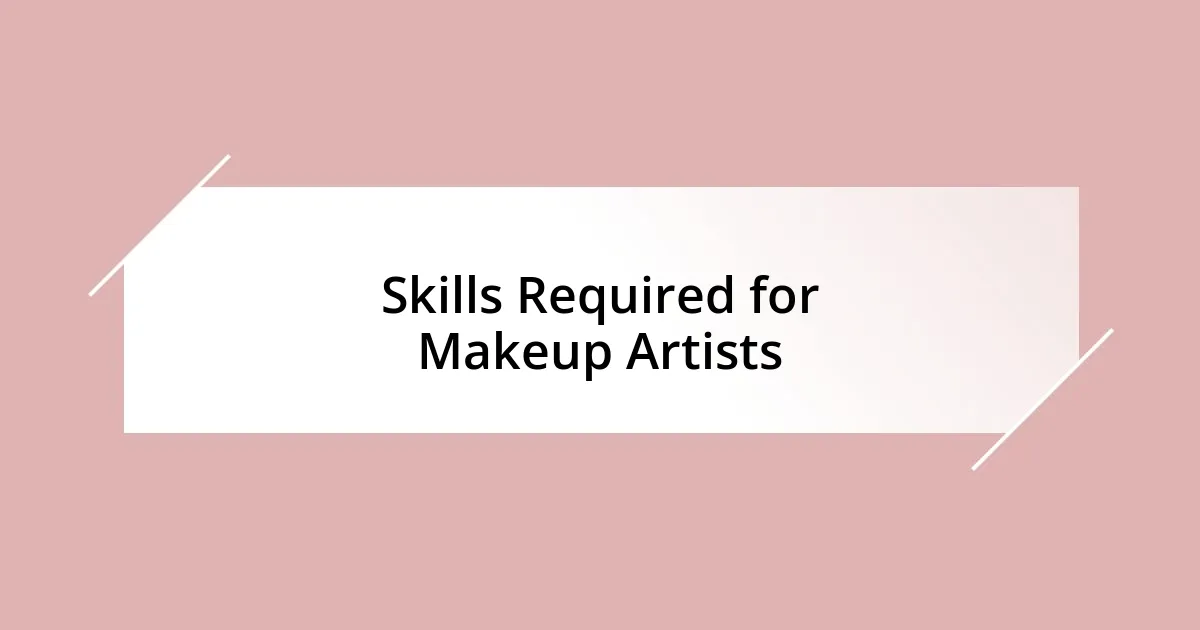
Skills Required for Makeup Artists
Makeup artists must possess a keen eye for detail. I remember the first time I tried to perfect a winged eyeliner look; it took me several attempts to get both sides even. It’s not just about artistry; it’s about precision and patience. Have you ever seen someone with flawless makeup? That’s a result of meticulous skill and practice.
Another essential skill is excellent communication. I’ve found that listening to a client’s vision makes all the difference in delivering the perfect look. When I ask questions like, “What are you hoping to achieve today?” it opens up a conversation that leads to a more tailored makeup experience. Isn’t it intriguing how a simple question can unlock so much creativity?
Furthermore, adaptability is crucial in this field. I vividly recall a last-minute request for a bold, dramatic look just moments before a photoshoot. I had to think on my feet and use what I had available. Sometimes, being resourceful and adapting to the situation is what sets you apart in the world of makeup artists. Don’t you think flexibility can transform a challenging moment into a triumphant success?
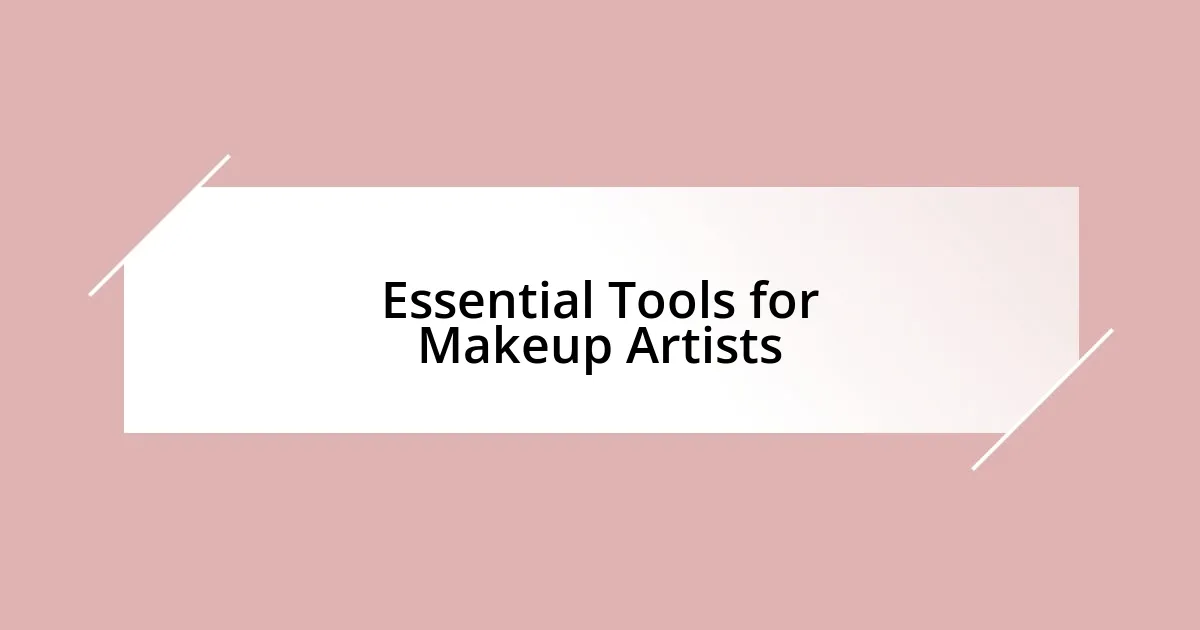
Essential Tools for Makeup Artists
Makeup artists rely heavily on a selection of essential tools to create stunning looks. From brushes to sponges, each tool serves a unique purpose. I once underestimated the power of a good blending brush until I worked on a client whose makeup required seamless transitions. It transformed the entire application process; the right tools can elevate a simple look to something extraordinary.
In my experience, skin preparation tools are just as vital as makeup itself. A quality primer or moisturizer can make all the difference in how makeup adheres and looks on the skin. I remember a client who had dry skin, and I used a hydrating primer that significantly improved the final look. It’s rewarding to witness how investing in skin prep pays off during application.
Lastly, let’s not forget the importance of organizational tools. Having a well-structured makeup kit not only streamlines the process but also enhances creativity. I learned this during a particularly hectic wedding day when I had to locate specific shades quickly. Keeping my tools organized allowed me to focus on what truly mattered: making my clients feel beautiful.
| Tool | Purpose |
|---|---|
| Foundation Brush | Ensures even coverage and a flawless finish. |
| Blending Sponge | Helps to seamlessly blend makeup products. |
| Eyebrow Pencil | Defines and shapes eyebrows for a polished look. |
| Setting Spray | Locks makeup in place for all-day wear. |
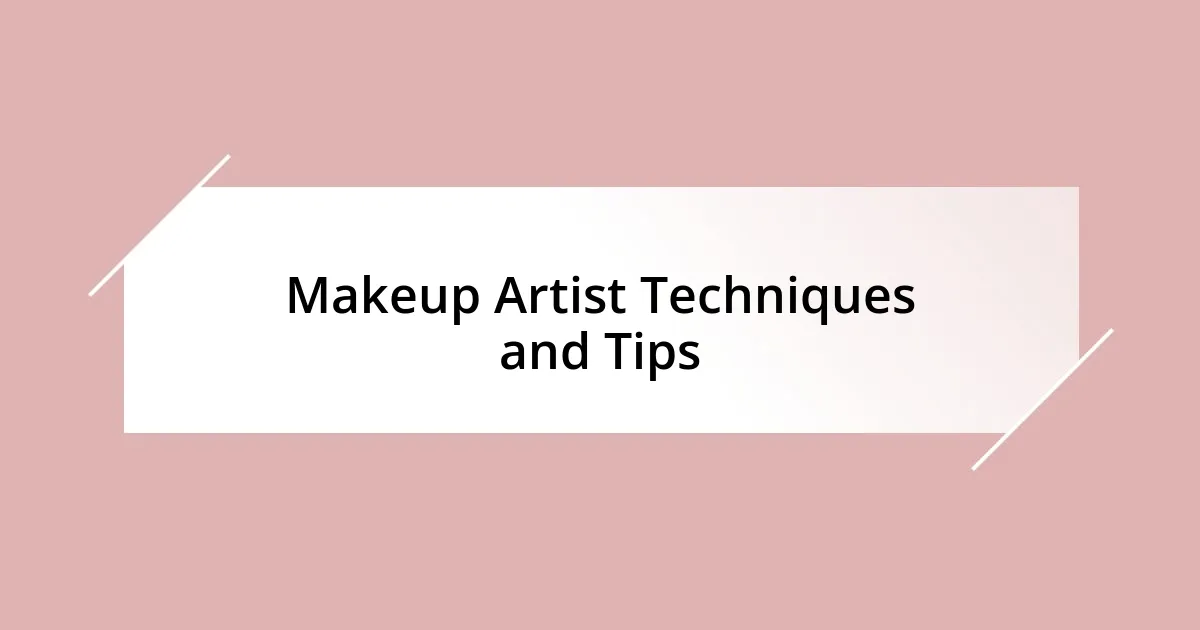
Makeup Artist Techniques and Tips
Makeup artists employ a variety of techniques, honing their craft to ensure each look is both stunning and tailored to individual needs. One technique that stands out is the art of contouring. I vividly recall experimenting with contouring on myself, and while it took some practice, the transformation was astounding. The subtle play of light and shadow can sculpt the face beautifully. I find it fascinating how understanding face shapes influences this technique; it’s not a one-size-fits-all approach.
Here are some techniques that every makeup artist should master:
- Highlighting and Contouring: Enhances facial structure and provides dimension.
- Color Theory: Understanding skin undertones guides color choices for a natural look.
- Layering Products: Allows for building coverage gradually to avoid a cakey finish.
- Setting Techniques: Using powders or sprays to lock in makeup and prolong wear.
A key tip for makeup artists is to always consider the setting when applying makeup. I once worked on a bride whose wedding took place outdoors on a hot summer day. This taught me the importance of using sweat-proof products and setting sprays to ensure her makeup lasted through the emotional highs of the day. The interplay of environment and technique can make or break a look, and personalizing the application is what I enjoy most about my role.
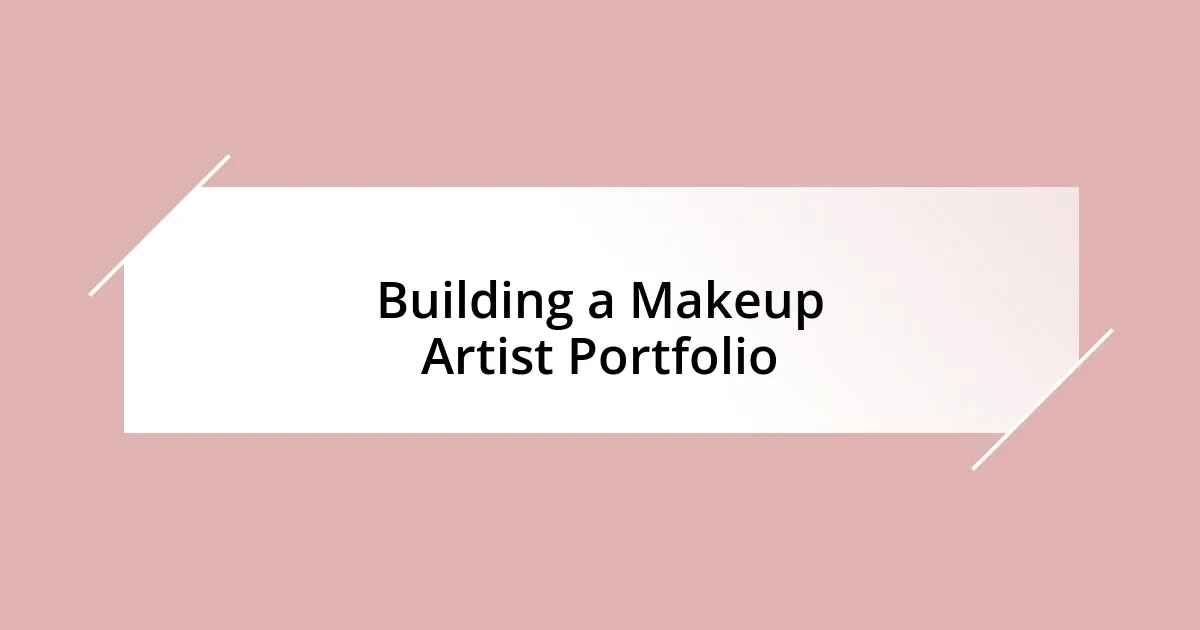
Building a Makeup Artist Portfolio
Building a solid makeup artist portfolio is crucial for showcasing your skills and attracting clients. I remember my first portfolio review; I felt a mix of excitement and anxiety. Having a collection of high-quality photos that highlight various looks, styles, and techniques really captured my growth as an artist. It made me realize that your portfolio isn’t just a collection of images; it’s a storytelling tool that conveys your unique artistic vision.
When I started, I made the mistake of including everything I had done, but I quickly learned that quality trumps quantity. Carefully curating my portfolio to reflect my best work helped me stand out. I chose pieces that demonstrated versatility—everything from bridal looks to editorial styles. Have you ever thought about what message your portfolio sends? It should reflect who you are as an artist, your style, and your passion for makeup.
Always remember to update your portfolio regularly. I now ensure that it evolves with my skills and trends. A potential client wants to see the most recent and relevant work. After an exhilarating photoshoot experience that pushed my creative boundaries, I couldn’t wait to include those shots. It reignited my passion for makeup artistry and reminded me that our portfolios are living documents that can inspire both ourselves and our future clients.
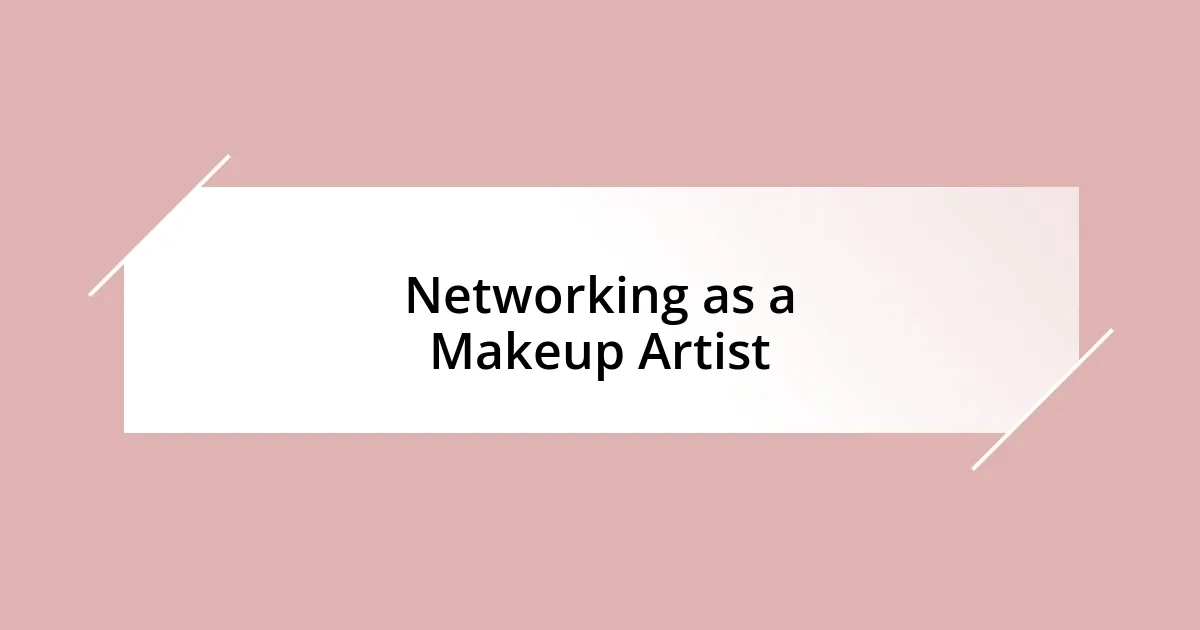
Networking as a Makeup Artist
Networking as a makeup artist isn’t just about exchanging business cards; it’s building authentic relationships that can lead to amazing opportunities. I remember attending a local beauty expo, feeling slightly out of my element, but I struck up a conversation with someone who later became a mentor. That casual chat turned into a collaboration, highlighting just how vital those unexpected connections can be.
Social media plays a pivotal role in networking today. Platforms like Instagram allowed me to showcase my work and connect with other artists and clients. I once received a direct message from someone who loved my style, which led to a fantastic project that expanded my reach even further. It made me realize that sharing not just my finished looks but also behind-the-scenes moments helps create a community; people love to feel a part of your journey.
Don’t underestimate the power of word-of-mouth in this industry. I recall a time when I had just wrapped up a small gig and a satisfied client referred me to her friends. That single recommendation opened doors to several new projects. It’s fascinating how genuine satisfaction can create ripples of opportunity. Have you thought about how your interactions, no matter how small, can leave a lasting impact on your career? Each connection could be the one that propels you forward.
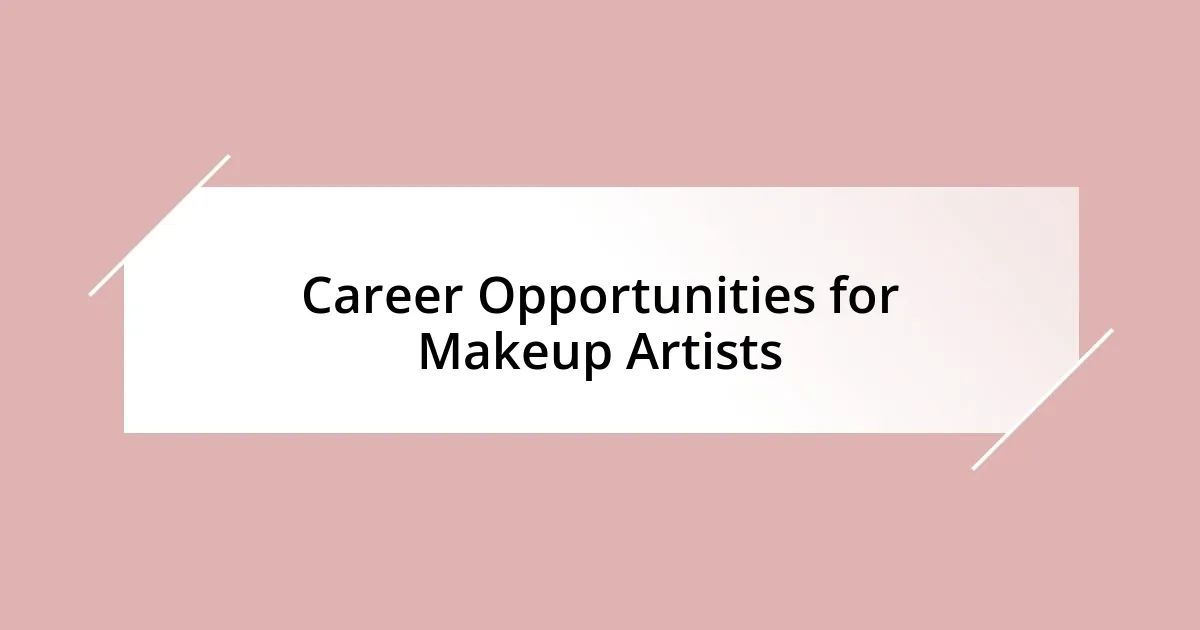
Career Opportunities for Makeup Artists
Career opportunities for makeup artists abound across various industries, reflecting the immense versatility of the craft. I once dipped my toes into the world of theatrical makeup, transforming actors into their characters. It was astonishing to see how specific skills can land you roles in film, television, and theater. Have you considered how adaptable your makeup skills could be? From crafting dramatic looks for a stage performance to creating subtle beauty for wedding clients, each avenue brings its own rewards.
The world of fashion is another promising avenue where makeup artists can thrive, particularly during runway shows and photoshoots. I vividly remember my first gig backstage at a fashion show; the atmosphere buzzed with excitement and creativity. Working alongside photographers and fashion designers taught me how integral makeup artistry is to a brand’s image. This experience opened my eyes to the importance of staying current with trends, as well as the networking potential that comes from collaborations with industry professionals.
Then there’s special effects makeup, which can be thrilling for those who love to push creative boundaries. I had the chance to assist on a local horror film project, and seeing the transformation of ordinary actors into otherworldly beings was exhilarating. The satisfaction of delivering incredible, lifelike effects brought a new dimension to my skills. It made me think: do you want to be the artist who creates beauty or the one who makes magic happen? Exploring these varied paths has shown me that the career of a makeup artist can be as unique as each individual who chooses it.







